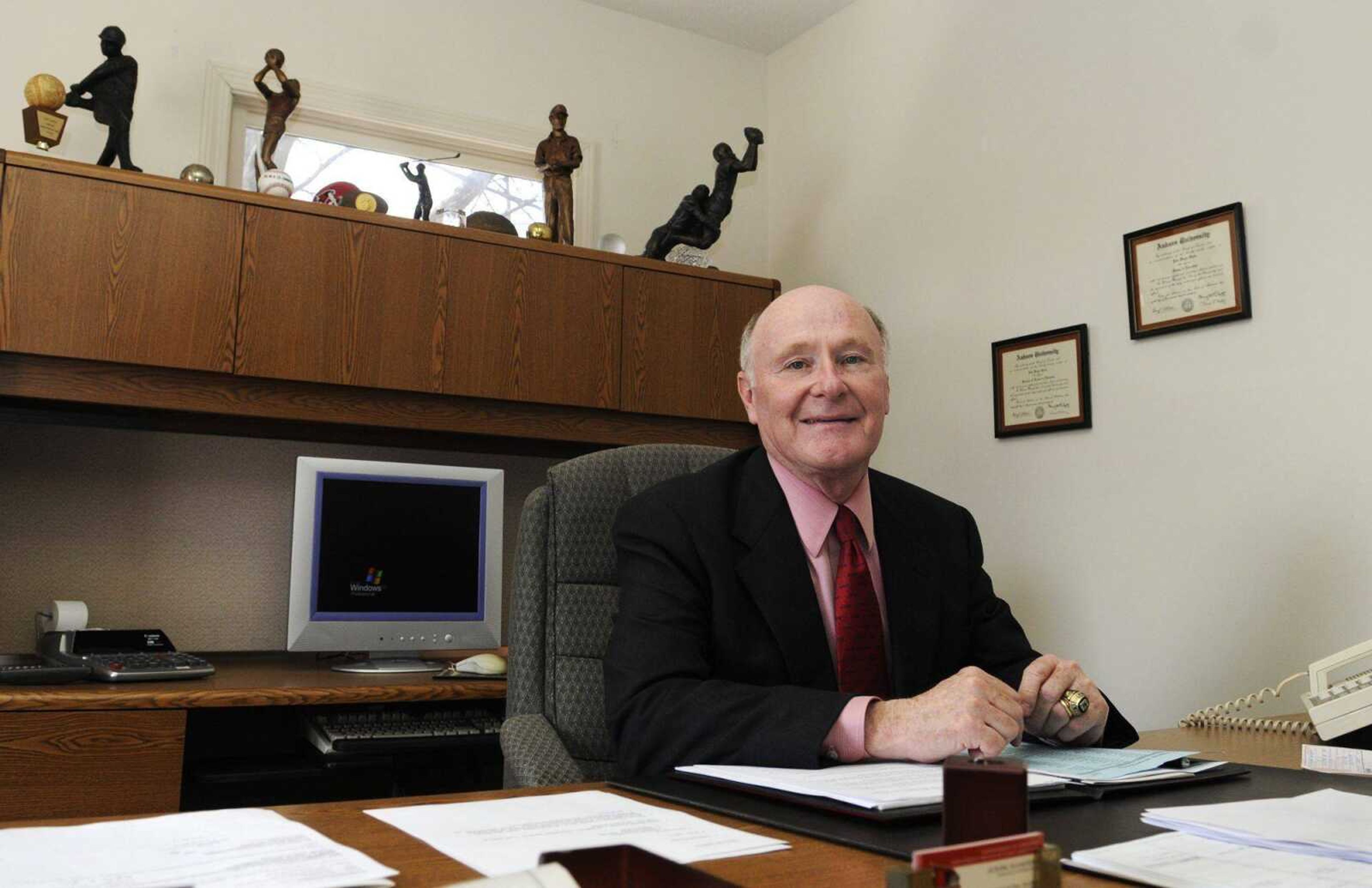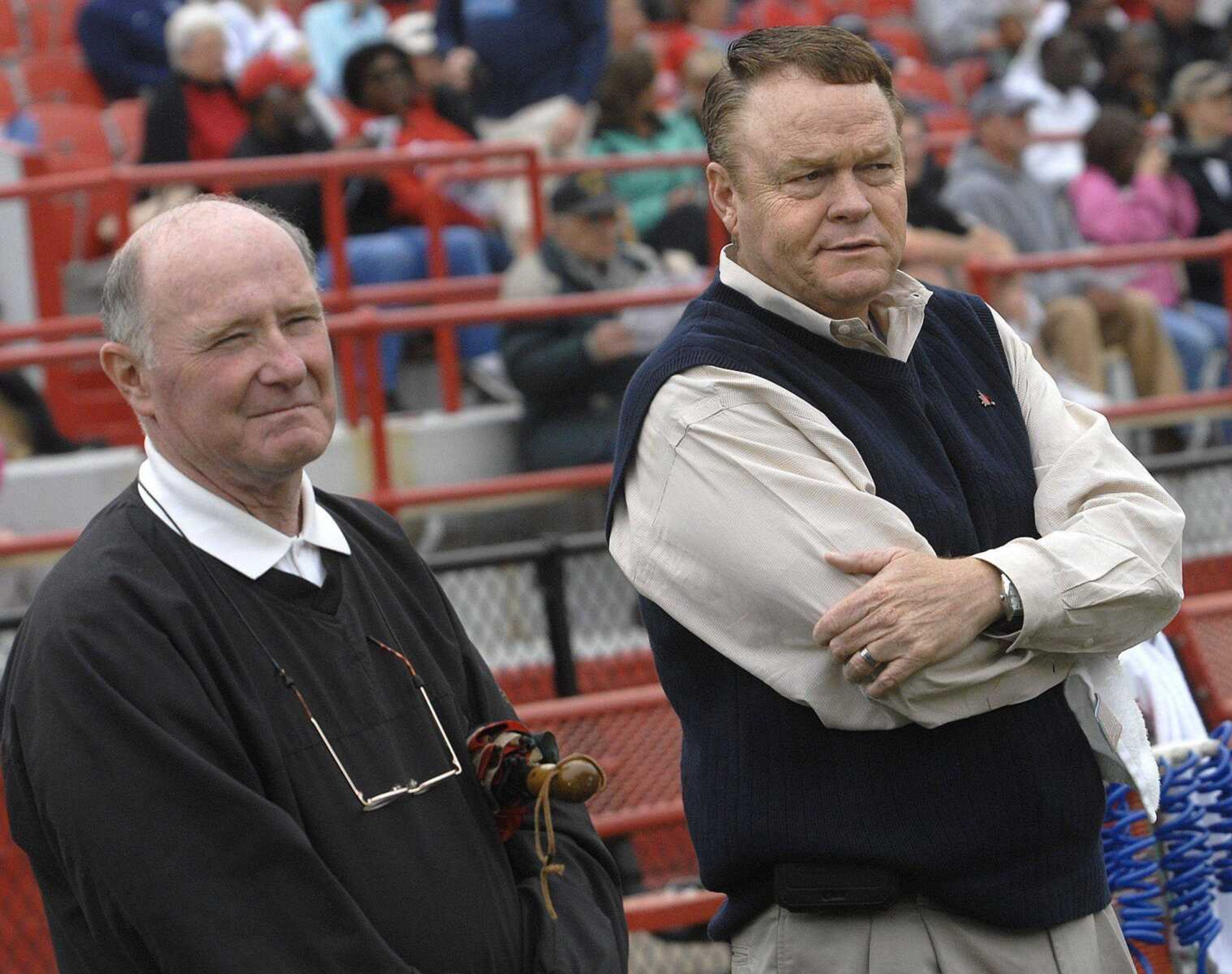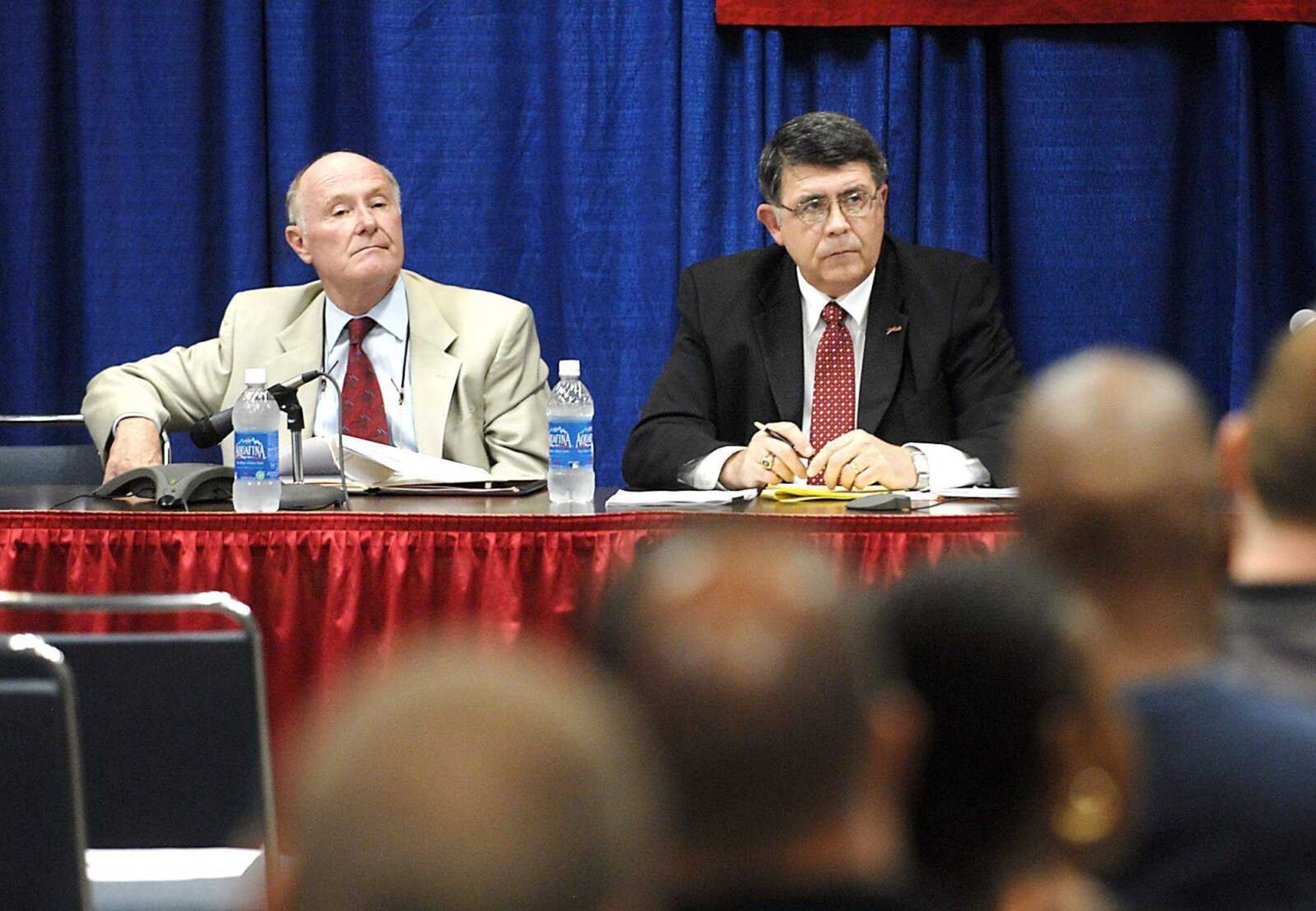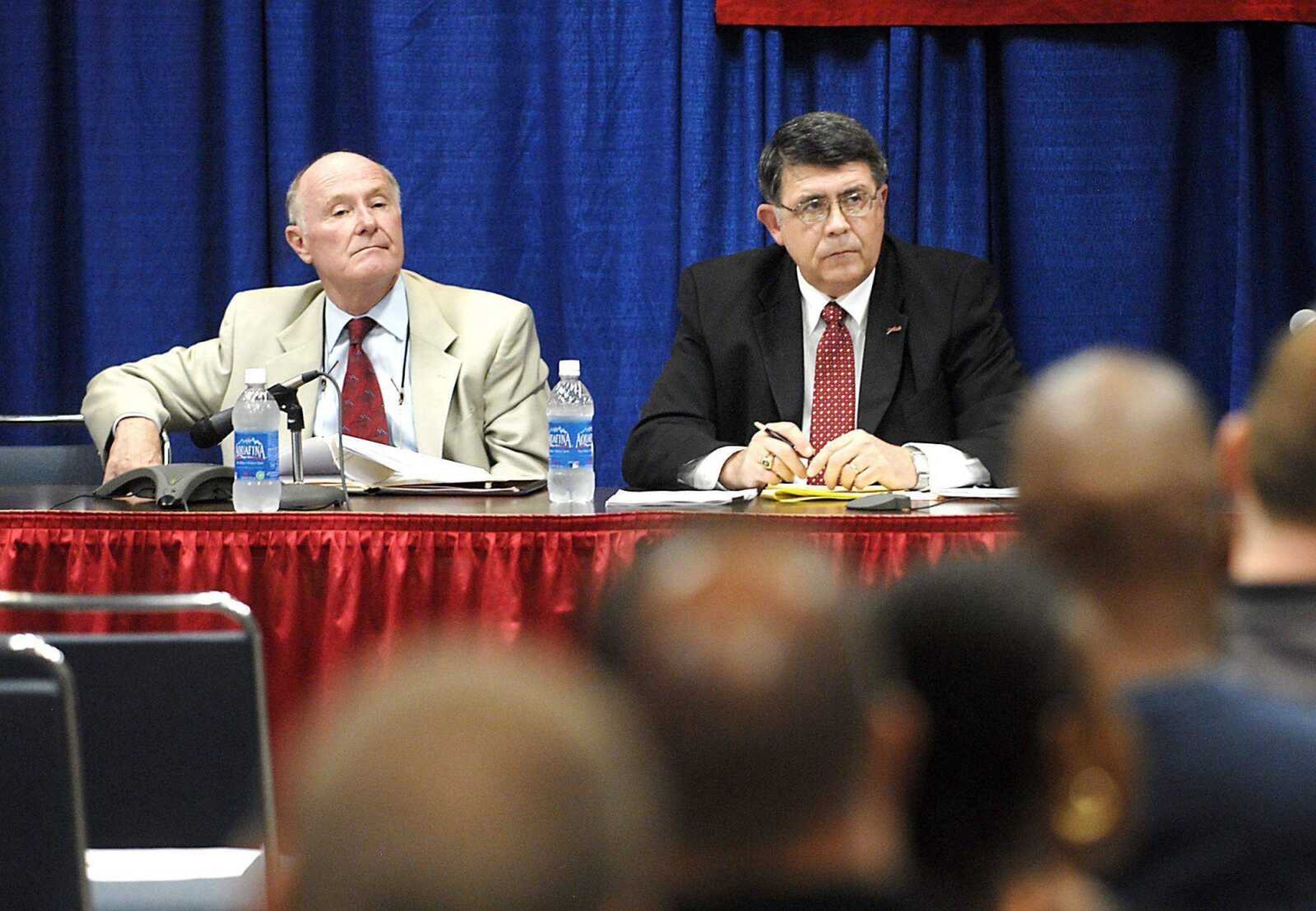Southeast AD John Shafer navigates the Redhawks programs through some choppy waters
John Shafer maneuvered some rocky waters during his first 14 months as Southeast Missouri State's athletic director. He inherited a department in the midst of an NCAA investigation and a men's basketball program suffering through a dreadful season. "I think it was exactly as I thought it would be," Shafer said about the state of the department when he took over Feb. ...
John Shafer maneuvered some rocky waters during his first 14 months as Southeast Missouri State's athletic director.
He inherited a department in the midst of an NCAA investigation and a men's basketball program suffering through a dreadful season.
"I think it was exactly as I thought it would be," Shafer said about the state of the department when he took over Feb. 1, 2009. "[University president Dr. Ken] Dobbins was very honest and forthright with me about the situation, and I expected it to be just like it was. I knew that my first charge was to clean up the basketball program. I knew that was the utmost importance at that time."
Shafer spent little time making a splash. He hired Dickey Nutt as the men's basketball coach March 12, a process that he described as one of the most difficult parts of his time at Southeast.
"Hiring Dickey and getting that behind me and in conjunction with that is you have to let a staff go at the same time," Shafer said. "Whenever you're dealing with people's lives, that's probably the toughest."

Shafer said he's pleased with the progress the men's basketball program showed during Nutt's first year and that it's headed in the right direction. He said he likes the direction the athletic department is headed after his first year on the job.
"I said this when I was hired this isn't a quick fix," he said. "The quick fix is that we're moving in the right direction."
The department's run-ins with the NCAA leave little room for error. Southeast will remain on probation with the NCAA until June 17, 2013, something Shafer said he thinks about daily. He leans on Brady Barke, the assistant athletic director for compliance and eligibility, and one of his hires, to keep the department out of more trouble with the NCAA.
"I believe that compliance has to be part of your program every day," Shafer said. "In this first year, we've been able to strengthen our compliance office with people and with educating our coaches. There's not a coaches meeting or administrative meeting that we have that we don't talk about compliance. If you don't work at it every day, something's going to jump up and bite you."
Shafer meets with all his coaches once a month and his administrative staff once every two weeks. Compliance always is discussed at those meetings.

"From experience I've learned that it's not something you can just hope happens," he said. "You have to work at it all the time, and we do from top to bottom."
Coaching changes
Shafer faces decisions on three of his coaches in the coming months. He announced Wednesday that the contract of women's basketball coach John Ishee has been extended one year. The contract of football coach Tony Samuel ends Jan. 31, 2011, after the upcoming season. Gymnastics coach Tom Farden resigned Oct. 19, and one of his assistants, Kristi Ewasko, is serving as the team's interim coach.
Shafer said he uses four criteria to evaluate a coach's success.
"First and foremost, is student-athlete welfare," Shafer said. "I want our kids to have a good experience here and I want them to be treated with dignity and respect. No. 2, I want them to graduate. No. 3 would really be I want them to do things the right way, and No. 4 I want them to win. Winning, in my eyes, as far as a coach, is way down the line. I believe if you do those first three, winning will take care of itself.

"If I were evaluating a coach, I would look strongly how they treat their kids, if they recruit good kids, bring in quality kids and make sure that the kids have a good experience. Then I would be sure they're going to school and working toward a degree because that's what we do."
Shafer isn't worried that some might be concerned that winning is No. 4 on his list. He said his career in college athletics, which started as an assistant business manager at Auburn University in 1977 and took him to such big-time programs as Georgia and Vanderbilt, taught him that winning should not be priority No. 1.
"When I talk to boosters or I talk to people who are win-at-all-cost, I've just been around it too long to know that if you have that mindset, there's going to be more disappointment that jubilation," he said. "Why put yourself through that? What I promise them is that I am going to give our student-athletes and our coaches every opportunity to be successful. That's my job."
He said he's not afraid to pull the trigger on a coaching change when necessary. He stressed that he believes in honoring contracts and tries to gather as much information about a program before making his decision.
"I want to be sure it's thought out and discussed and look at all the options," he said. "Have I been doing my job to make sure they have been successful? That goes through my mind. I do lose a lot of sleep during that time."
Scheduling
Football is the lone sport at Southeast that Shafer develops the schedule for. He's already locked up games at Ball State and Purdue in the coming years and said he's had conversations with a handful of other top-tier programs.
"I'm talking right now with Ole Miss, Mississippi State, of course I've talked to Georgia several times, I've talked to Vanderbilt, I've talked to Mizzou again," he said. "We're looking everywhere."
One of his duties when trying to schedule "money games," where the university is paid a handsome sum to play at a powerhouse program, is to get as much money as possible while finding an opponent that Southeast has a chance to upset.
"Most of the people I talk to are friends or our paths have crossed over time so they know I'm going to shoot straight and I know they're going to shoot straight," he said. "There's not much dickering. They trust me and I trust them. I tell them straight that we need X number of dollars to cover our budget needs."
Academic success
Shafer said one of his proudest accomplishments during his tenure has been the success Southeast student-athletes have enjoyed in the classroom. The department achieved a 3.12 grade-point average during the fall 2009 semester, its best ever. There also were 17 Southeast student-athletes who won Ohio Valley Conference Medals of Honor, which are awarded to student-athletes who achieve the highest GPA in a conference-sponsored sport.
"Such a small percentage of college athletes get to go on and play professionally that we better be preparing these kids for the real world and getting a job," he said. "I'm easy to please. I would love to see a smiling kid walk across that stage and get a diploma."
Staying put
Shafer said he hasn't thought about how long he'll remain at Southeast. He signed a 3 1/2-year contract that runs through the 2011-2012 academic year. He's paid $120,000 annually and also receives $20,000 per year to purchase an annuity.
"I'm going to do it until it's not fun to get up in the morning and go to the office," he said. "I get up at 5 o'clock in the morning and I read [the newspaper] and have some coffee and think about how great it is to be doing what I do. When that stops, no one will have to run me off. I'll just fade into the sunset."
Connect with the Southeast Missourian Newsroom:
For corrections to this story or other insights for the editor, click here. To submit a letter to the editor, click here. To learn about the Southeast Missourian’s AI Policy, click here.



